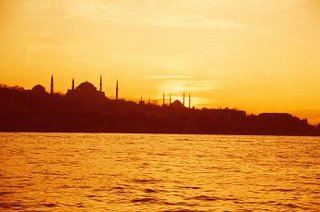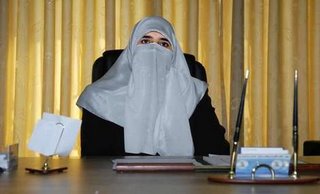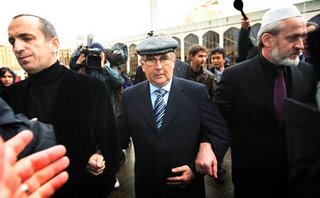
KEMBALILAH KEPADA EMAS DAN PERAK
Dalam perkembangan yang berkaitan, lebih kurang sebulan lepas, Presiden Iran, Ahmadinejad menggesa untuk memulau Dollar Amerika (USD) sebagai alat pertukaran untuk urus niaga komoditi petroleum memandangkan USD telah jatuh secara kronik sejak 12 bulan yang lalu. Beliau berkata "They [the US] get our oil and give us a worthless piece of paper," (Amerika mengambil minyak kita dan membayar kita dengan sekeping kertas yang tidak berguna) Mengikut Ahmadinejad lagi, perolehan semakin berkurangan kerana penurunan nilai USD sebagai alat tukaran di pasaran dunia, yakni apabila petroleum dijual dengan USD. Dia juga menggesa supaya urusan jual-beli petroleum menggunakan matawang lain, bahkan dia mengatakan bahawa negara-negara OPEC bersetuju untuk mencairkan simpanan USD mereka kepada matawang lain. Jepun misalnya, telah mengorak langkah membeli petroleum dari Iran dengan matawang Yen. Dalam pada itu, Rejim Arab Saudi - sekutu rapat Rejim AS - sibuk membela penggunaan matawang USD dan menyerang pendapat Ahmadinejad. Kenyataan rasmi dari Rejim Saudi menggesa agar tidak dibangkitkan isu ini, bahkan mereka memberi amaran bahawa perkara sebegini akan menurunkan lagi nilai USD.
Penulisan Sautun Nahdhah (SN) kali ini menyentuh secara ringkas bagaimana untuk kita menukar standard matawang yang benar (hak) dan mengelak dari menggunakan matawang asing sebagai sandaran/standard nilai. Sandaran kepada matawang asing, selain bertentangan dengan hukum syarak, secara realitinya ia akan mendedahkan kita kepada ketidakstabilan matawang/ekonomi kerana selama mana ‘sekeping kertas’ digunakan sebagai sandaran nilai, maka selama itulah matawang/ekonomi akan terdedah kepada persepsi dan spekulasi. Bukti sudah sekian lama terpampang jelas di depan mata bahawa nilai matawang/kertas tersebut sentiasa terumbang-ambing jika berlaku ketidakstabilan baik dalam ekonomi mahupun politik, malah dengan ‘kata-kata/perbuatan’ seorang manusia sahaja, nilai matawang boleh merudum. Oleh yang demikian, langkah-langkah yang benar (menurut Islam) perlulah diambil untuk mengelak krisis kewangan seperti tahun 1997 dari berulang dan menjatuhkan ekonomi umat Islam.
Sandaran Matawang Wajib Emas Dan Perak
Bila kita melihat kepada dua laporan di atas, kita boleh membuat kesimpulan bahawa, greenback atau USD sebenarnya digunakan sebagai standard nilai untuk perdagangan antarabangsa, terutamanya untuk urus niaga minyak mentah, bijirin dan kelapa sawit. Senario kejatuhan USD di pasaran kewangan antarabangsa yang berterusan secara relatifnya telah menaikkan nilai ringgit. Jadi, kenaikan nilai ringgit sebenarnya bukanlah kerana kekukuhan nilai ringgit itu sendiri, tetapi kerana penurunan nilai USD. Kejatuhan nilai USD inilah yang telah menyebabkan Ahmadinejad menyarankan agar ditukar penggunaan matawang USD ke matawang lain. Pandangan ini, walaupun nampak bernas, namun teramat serong dan keliru. Ini kerana kejatuhan USD akan sebenarnya mengurangkan lagi kekayaan di dalam sesebuah negara yang memegang kuantiti besar USD, terutama di dalam rizab mereka. Lagi pula, menukar matawang USD kepada matawang lain belum tentu dapat menstabilkan pasaran matawang dan ekonomi itu sendiri. Ini kerana, jika USD yang sudah berpuluh tahun dianggap kukuh, malah menjadi sandaran matawang dunia, itu pun boleh jatuh, apatah lagi matawang lain, yang belum pernah terbukti ‘kekuatannya’ di peringkat antarabangsa dan yang mana ‘nilai kertasnya’ tidak jauh berbeza dengan ‘nilai kertas’ USD. Apakah gerenti yang ada bahawa matawang baru ini akan terus kukuh? Apa pun, aspek yang paling penting bagi kaum Muslimin dalam hal ini ialah aspek hukum syarak, maksudnya kewajipan menggunakan sandaran emas dan perak bagi penggunaan matawang. Hal inilah yang tidak pernah dipandang atau diperhitungkan oleh pemimpin umat Islam.
Semua sedia maklum bahawa wang kertas yang ada pada kita sekarang hakikatnya adalah sekeping kertas yang ‘tidak bernilai’. Ia boleh diconteng sesuka hati; mudah dikoyakkan dan apabila terkoyak, ia langsung sudah tidak bernilai; ia mudah terbakar dan akan hangus apabila dibakar. Wang kertas yang ada sekarang hanya ‘bernilai’ kerana pemerintah (melalui undang-undang) menyatakannya bernilai (legal tender) dan mereka ‘memaksa’ kita agar menerima nilai yang tertera di atas kertas tersebut. Sebab itulah, walaupun jenis kertas yang sama, saiz yang sama dan tebal nipisnya pun sama, kemudian diletakkan angka 10 di situ, maka ia akan bernilai RM10, manakala jika ditulis angka 50, maka ia akan bernilai RM50. Dan apabila kerajaan ingin mengeluarkan wang kertas yang baru dan melupuskan wang kertas yang lama, kerajaan hanya perlu ‘menyatakan’ dan memaksa kita (melalui undang-undang) bahawa wang yang lama sudah tidak boleh dipakai. Maka pada tarikh itu juga, wang kertas yang tertulis RM50 di atasnya tadi, akan terus menjadi ‘sekeping kertas’ yang langsung sudah tidak bernilai, kecuali sebagai ‘sekeping kertas’ semata-mata.
Islam dalam bentuk penyelesaian yang jelas telah menggariskan kepada kita bahawa matawang dalam Islam bukannya ‘wang fiat’ yang disandarkan kekuatannya kepada undang-undang (legal tender), tetapi Islam telah meletakkan satu ‘benda’ yang benar-benar bernilai untuk digunakan oleh manusia – emas dan perak. Seiring dengan ini, Islam telah meletakkan hukum-hakam yang khusus untuk penggunaan wang ini (emas dan perak) dan menjadikannya wajib untuk dijadikan sandaran. Sebagai seorang Muslim, kita mestilah melihat penggunaan matawang ini dari perspektif syarak, bukannya dari perspektif ekonomi semata-mata yang seolah-olah langsung tidak ada hubungan dengan agama. Kita adalah umat Islam dan kita wajib mempelajari dan melaksanakan ekonomi yang digariskan oleh Islam, bukannya belajar dan melaksanakan ekonomi dalam acuan Kapitalis yang hanya berhukum dengan hukum akal. Justeru, pengembalian kepada standard matawang emas dan perak bukanlah semata-mata untuk menyelamatkan ekonomi negara, malah yang paling utama adalah untuk menyelamatkan diri kita dari azab Allah, jika tidak berhukum dengan hukum Allah. Sandaran matawang kepada emas dan perak merupakan hukum syarak yang jelas di dalam Islam, yang wajib dilaksanakan oleh Negara [sila lihat perbincangan lanjut dalam SN072 Emas Dan Perak – Antara Manfaat Dan Tuntutan Syarak].
Bagaimana Mengubah Matawang Kepada Dinar Dan Dirham
Kita perlu sedar bahawa kita sekarang hidup di dalam realiti ekonomi/dunia Kapitalis dan kita sedang menuju kepada sebuah Negara Khilafah yang akan menerapkan semula sistem matawang sebagaimana pada zaman pemerintahan Rasul dan para sahabat dahulu. Pada masa pemerintahan Khalifah Abdul Malik bin Marwan (dari Bani Umawiyyah) telah dicetak dan diterbitkan matawang dinar dan dirham syarie. Keduanya berlaku sebagai matawang dan alat perantaraan pertukaran dalam semua bentuk transaksi barang mahupun perkhidmatan. Baik dinar mahupun dirham, dicetak pada standard tertentu merupakan timbangan berat (wazan) tertentu yang bersifat tetap. 1 dinar syarie setara dengan 4.25 gram emas, sedangkan 1 dirham syarie setara dengan 2.975 gram perak. Pada masa itu mata wang yang beredar hanyalah dalam bentuk logam emas (dinar) mahupun perak (dirham). Dalam keadaan di mana transaksi-transaksi yang bernilai besar terlibat dan matawang yang berbentuk logam emas atau perak tidak praktikal untuk dibawa atau dipindah-pindahkan, Negara sememangnya boleh menggantikannya dengan wang kertas, wang plastik, wang polimer atau bahan-bahan lainnya yang bersifat praktikal. Syaratnya, wang kertas atau wang polimer tersebut mestilah tergolong dalam kategori paper money (paper money adalah matawang yang dikeluarkan oleh kerajaan atau bank pusat dan merupakan kertas yang dicetak yang boleh berputar sebagai pengganti) di mana nilai nominalnya mesti dijamin oleh Negara, setara dengan nilai nominal emas atau perak yang ada di dalam simpanan negara. Dengan kata lain, emas atau perak wajib dijadikan sandaran di mana paper money yang berlegar di pasaran mestilah menyamai nilai emas atau perak yang ada dalam simpanan.
Sebagai seorang Muslim, kita mengharapkan pemerintah Muslim yang ada agar menerapkan segera sistem matawang Islam sebagaimana yang telah diterapkan oleh Rasulullah, namun harapan kita telah lama berkecai dek mereka lebih kasihkan Sistem Kapitalis yang buruk dan busuk ini. Jadi, kita hendaklah bersedia untuk menerapkan hukum Allah dari sekarang dan apabila Negara Khilafah berdiri nanti (Insya Allah dalam waktu terdekat), langkah-langkah praktikal untuk menggantikan matawang yang ada di tengah-tengah kaum Muslimin saat ini terus dapat dilaksanakan. Buat masa sekarang, beberapa perkara perlu diperhatikan. Di antaranya adalah jumlah matawang yang beredar, harga emas atau perak di dalam mahupun di pasaran luar negeri, jumlah emas dan perak yang sedia ada dan jumlah simpanan Bank Pusat (yang umumnya berbentuk dolar AS atau matawang asing yang kukuh - hard currencies - lainnya). Kesemua ini perlu diperhalusi agar kita dapat memback-up penggantian matawang kepada dinar dan dirham. Pada prinsipnya, simpanan (baik emas atau perak ataupun matawang asing) yang dimiliki Negara Khilafah pada masa berdirinya nanti harus mampu memback-up penggantian matawang yang ada di dalam masyarakat. Jika simpanan yang sedia ada ini tidak mencukupi, secara praktikalnya penggantian matawang akan sukar dilaksanakan (untuk maklumat mengenai simpanan rizab dalam Bank Negara, sila layari http://www.bnm.gov.my)
Komponen jumlah wang yang beredar di dalam masyarakat pada umumnya dinyatakan sebagai agregat kewangan yang dikenali dengan M1, M2, dan M3. M1 disebut juga dengan wang transaksi, iaitu wang yang benar-benar digunakan dalam berurus niaga, meliputi wang syiling, wang kertas dan deposit permintaan (akaun cek/akaun semasa). Jumlah syiling dan wang kertas dinamakan dengan wang dalam edaran (currency), yang biasanya meliputi seperempat atau seperlima dari jumlah M1. Mengikut laporan Bank Negara Malaysia, jumlah matawang dalam edaran adalah RM34,888 juta sedangkan jumlah M1 adalah RM159,020.80 juta. Deposit permintaan adalah wang yang disimpan di bank atau lembaga kewangan, untuk akaun cek (akaun semasa). Dengan jenis akaun ini, kita dapat membayar suatu transaksi dengan cara menulis atau menandatangani buku cek, jumlahnya adalah RM124,132.80 juta. Agregat lain yang sering mendapat perhatian adalah M2, yakni yang disebut dengan wang dalam pengertian luas (broad money). M2 ini merupakan M1 + Separuh Wang Kecil (Narrow Quasi Money - NQM), yang mana NQM ini meliputi deposit tabungan, deposit tetap, NID (Negotiable Instrument Deposit), repos (perjanjian jualan semula bond), deposit matawang asing dan lain-lain deposit. Secara umumnya NQM tidak termasuk wang transaksi, karena tidak dapat digunakan sebagai alat tukar untuk seluruh pembelian. Meskipun demikian ia boleh ditukar kepada bentuk wang tunai dengan cepat tanpa kehilangan nilainya. Oleh itu, M2 disebut juga dengan near money, karena dapat ditukarkan menjadi wang tunai dengan mudah. Mengikut laporan BNM jumlah M2 adalah RM768,323.70
Pada umumnya, M1 dan M2 inilah yang dijadikan acuan utama untuk mengetahui dan mengawal wang edaran yang berlegar di dalam masyarakat. Masalahnya sekarang, apakah Negara Khilafah akan mengganti M1 saja atau akan mengganti M1 dan M2 sekali gus (meski inilah pilihan yang paling tepat dan lebih selamat)? Kemudian, apakah rizab simpanan yang dimiliki negara saat ini mencukupi untuk menjamin jumlah nilai nominal M1 dan M2 yang ada? Apakah emas atau perak yang dimiliki negara (dalam simpanan rizab atau yang akan dibelinya di pasar emas internasional) telah cukup tersedia? Jika jawapannya ya, Negara Khilafah saat berdirinya nanti terus dapat menggantikan matawang yang ada menjadi dinar dan dirham yang syarie dengan lebih mudah Ini tentu dengan beberapa anggapan, misalnya tidak ada hutang yang harus dibayar pada waktu itu, atau tidak ada pelarian emas dan perak ke luar negeri.
Di Malaysia, jika ingin menukarkan sistem matawang kepada dinar dan dirham dan diketahui jumlah wang yang beredar (misalnya) M1 = RM159,020.80 juta, M2 (katakan 5 kali ganda) = RM768,323.70 juta, sedangkan harga emas di dalam negeri 1 gram = RM94.00, jadi Negara Khilafah paling tidak harus memiliki rizab sekurang-kurangnya menyamai dengan jumlah M1 = RM159,020.80 juta untuk menukarkan wang dalam edaran dan juga deposit permintaan. Secara umumnya, angka-angka yang disebut di atas dapat diringkaskan seperti di bawah. Nilai satu dinar syarie ialah 4.25g X RM94 = RM399.50
Agregat Kewangan Jumlah dalam juta Unit Dinar Syarie (DS)
Rizab BNM RM345,229.20 DS864.20 juta
M1 RM159,020.80 DS398.00 juta
M2 (M1 + NQM) RM768,323.70 DS1,923.20 juta
Jadual menunjukkan bahawa jika rizab Bank Negara dalam bentuk jongkong emas dan matawang asing digunakan untuk menukar matawang, ia adalah mencukupi. Jadi, secara umumnya rakyat akan dapat menukarkan semua matawang dalam edaran kepada sistem matawang Islam. Masalah cuma akan timbul sekiranya semua pendeposit NQM mengeluarkan simpanan mereka dalam jumlah yang besar untuk dicairkan kepada matawang DS, tetapi kes semacam ini sukar untuk berlaku. Namun jika ia tetap berlaku, maka Negara Khilafah boleh mengeluarkan surat jaminan untuk membayar balik dalam bentuk DS (bila Baitul Mal nanti sudah memperolehi hasil pendapatan negara) sebagaimana Rasulullah Sallallahu ‘alaihi wa Sallam pernah memberi jaminan untuk menggantikan hamba Bani Hawazin yang dipulangkan balik kepada kaumnya, Rasulullah Sallallahu ‘alaihi wa Sallam bersabda “Sesungguhnya saudara kamu ini (Bani Hawazin) datang kepada kita setelah mereka bertaubat, aku sendiri akan memulangkan kepada mereka tawanan perang dari bangsa mereka, sesiapa daripada kamu yang suka untuk berbuat kebajikan, pulangkan tawanan masing-masing kepada mereka, barang siapa yang suka untuk mendapatkan bahagian yang pertama dari ghanimah kelak, yang bakal diberikan oleh Allah nanti kepada kita, maka hendaklah dia memulangkan tawanan” [HR Bukhari, Tabari, Baihaqi dengan jalan Ibn Ishaq]. Riwayat ini menerangkan kepada kita bahawa Rasulullah memberi jaminan untuk menggantikan hamba yang dipulangkan balik kepada Bani Hawazin, dengan hamba yang akan ditawan pada masa akan datang, ini menjadikan dalil bahawa Pemimpin Negara boleh membuat jaminan pembayaran.
Apabila semuanya sudah cukup dan tersedia, Negara Khilafah nanti hanya perlu mencetak dinar atau dirham syarie, kemudian rakyat diberi tempoh masa untuk menukar matawang mereka kepada dinar dan dirham, dengan kadar RM399.50 untuk DS1.00. Contohnya Negara Khilafah memberikan masa 3 bulan untuk semua RM ditukar kepada DS, sebagaimana BNM dahulu pernah memberi masa untuk melupuskan syiling RM1. Proses ini mirip dengan apa yang terjadi di negara Kesatuan Eropah tatkala negara-negara anggotanya secara hampir bersamaan mengubah matawang mereka kepada matawang Eurodollar. Perbezaannya adalah, dalam Negara Khilafah nanti, nilai nominal wang yang beredar (baik pada M1 mahupun M2) dijamin dan disokong (disandarkan) oleh emas atau perak yang nilainya setara dengan jumlah wang yang beredar dan jumlah ini disimpan di dalam Baitul Mal negara sebagai jaminan (guaranteed); sedangkan Eurodollar, sama dengan USD, berbentuk fiat money, iaitu sekumpulan kertas yang oleh pemerintah dianggap sebagai legal tender dan masyarakat ‘diwajibkan’ menerimanya sebagai alat pembayaran/transaksi yang memiliki nilai tertentu. Inilah yang berlaku sekarang di mana negara-negara yang ada waktu ini (termasuk Malaysia) yang menganut fiat money boleh mencetak sebanyak mana pun matawang kertasnya dan dengan nilai nominal berapa pun, tanpa diback-up oleh jaminan emas atau perak. Praktis ekonomi Kapitalis inilah, pada satu titik dan keadaan tertentu, legal tender ini pasti akan runtuh dan selonggok ringgit atau dolar sekalipun akan sama nilainya dengan setompok sampah sarap (kertas) biasa di waktu keruntuhannya.
Dengan demikian, usaha kita untuk memiliki dana yang tersedia dan mencukupi (simpanan rizab) harus dimulai dari sekarang (meski Negara Khilafah itu belum lagi berdiri), iaitu dengan mencegah pelarian emas atau perak ke luar negeri. Langkah-langkah praktikal yang mampu menjaga dan menambah emas atau perak sedia ada antara lain:-
(i) Negeri-negeri kaum Muslimin pada masa kini mestilah mengurangkan atau bahkan menghentikan import barang-barang ke luar negeri. Sebab, hal ini hanya akan mengakibatkan pelarian modal ke luar negeri;
(ii) Meningkatkan eksport ke luar negeri, dengan mengambil pembayaran dalam bentuk emas/perak atau jika kita (perlu) mengimport, kita membuat pembayaran dengan matawang asing yang ada dalam negara, khususnya USD;
(iii) Menghentikan dan mengambil alih perusahaan-perusahaan perlombongan (termasuk lombong emas dan perak) yang dikonsesikan kepada pihak asing. Dengan begitu, negaralah yang akan mengeluarkan, mengawal dan menjadikannya sebagai rizab untuk sandaran nilai penerbitan dinar dan dirham yang syarie;
(iv) Negara boleh mendesak untuk setiap urus niaga perdagangan dengan luar negeri untuk menggunakan standard dinar dan dirham (atau matawang yang berasas pada logam emas dan perak). Dalam hal ini, Negara Khilafah nanti dapat memperoleh keuntungan kapital berupa emas dan perak dari pembayaran komoditi strategik yang diperlukan oleh dunia internasional, seperti minyak.
Berdasarkan penjelasan ini, tidak mungkin suatu negara dapat menerapkan dan mengubah matawangnya menjadi dinar dan dirham yang syarie, kecuali negara tersebut mampu melawan hegemoni politik, ekonomi, dan militer negara-negara besar saat ini, terutama AS. Sebab, AS tidak akan tinggal diam terhadap keberadaan negara lain yang akan menghancurkan sistem ekonomi kapitalis yang dibangun untuk melayani kepentingan-kepentingannya di seluruh dunia. AS menghendaki seluruh negara yang ada di dunia merujuk pada greenback atau USD, karena hal ini dapat dijadikan senjata dan alat imperialisme baru AS untuk menghancurkan atau mengeksploitasi kekayaan negara-negara lain di dunia. Ini bererti, keinginan untuk mengubah matawang negeri-negeri umat Islam yang ada pada hari ini menjadi dinar dan dirham syarie yang bersandarkan emas dan perak (yang nilai nominal dan intrinsiknya sama) harus disertai dengan keinginan yang kuat umat Islam untuk memiliki Negara Khilafah yang besar dan bersatu dan akan menjadi negara super power di dunia.
Khatimah
Wahai kaum Muslimin! Sistem matawang yang syarie tidak akan berhasil diwujudkan di dalam sebuah negara yang terkongkong oleh dominasi ekonomi Kapitalis dan sangat bergantung pada kekuatan ekonomi global (terutama ekonomi negara-negara kafir Barat). Untuk itu, umat Islam mahupun para penguasa kaum Muslimin saat ini harus mula menyediakan simpanan rizab (dalam bentuk emas dan perak) agar bila berdirinya Negara Khilafah (dalam waktu yang terdekat, Insya Allah) kaum Muslimin dapat menerapkan secara kaffah seluruh hukum-hukum Islam, termasuklah hukum-hukum tentang matawang. Kalian wahai saudaraku, sekarang hanya ada dua pilihan sahaja, apakah kalian ingin terus kekal berada di bawah telapak kaki Kapitalisme yang penuh dengan kotoran dan najis ini, atau kalian bersungguh-sungguh berjuang, berkorban, dan bekerja keras untuk menerapkan hukum-hukum Allah melalui tegaknya negara Khilafah ar-Rasyidah yang mengikuti manhaj Nabi Sallallahu ‘alaihi wa Sallam. Buatlah pilihan yang boleh menyelamatkan kalian dari azab Allah kelak.












